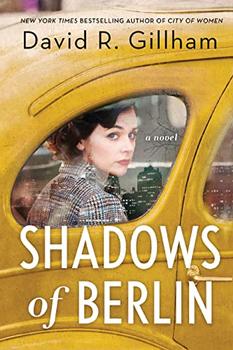Summary | Excerpt | Reading Guide | Discuss | Reviews | Beyond the Book | Readalikes | Genres & Themes | Author Bio

A Novel
by David R. Gillham1.
All Is Perfect
She imagines the final moments as white, pure white, as the plane plunges through the blizzard. The snow obscures the cockpit glass until the mountain emerges in a split second of clarity, the cliff face surging forward in the instant before impact.
Her shrink tilts his head. Slightly. "Why only plane crashes?" he wonders. "Why not floods or train wrecks or any number of other disasters?"
She recalls the headline of the story that she had carefully scissored from the newspaper that morning with her sewing shears. JET HITS MOUNTAIN IN SNOW SQUALL. Below the headline, a photo of the wreckage revealed the result. A twisted, torn fuselage in pieces. Chunks of smoking steel.
"I think the crash of an airplane is different," says Rachel.
Dr. Solomon frowns reflectively. An arm and a leg he's being paid, so it's his job to ferret out this young woman's madness, isn't it? Just as it's her job to be just mad enough to be cured. "Different?"
"Because they are so sudden," she explains. Quietly. "So complete. And so very few survive it. How is the decision made?"
The man tilts his head again. She can tell he's not quite sure what she means. How is what decision made?
"Only a handful may live through it when most do not. How is that decided?" she asks. She began collecting the clippings from the newspapers sometime after she and her uncle had arrived in the States and taken up residence in the hotel for refugees on Broadway. She was always buying newspapers at her uncle's insistence. To improve their English, he maintained, though what did he end up reading, her Feter Fritz? Der Forverts in Yiddish. Sitting at the little café table with his cup of Nescafé. But was that really when she began snipping out the headlines of aerial catastrophes?
She was twenty-one the year they arrived in the Port of New York aboard the Marine Sailfish in 1949. Over six years ago. The few photographs of her taken at the time show a haunted, dark-mopped waif. She was an open wound at that point. Bundled in ill-fitting castoffs, thin as a matchstick, and still faintly stinking of a continent burnt to ashes. Stumbling over her English, she was boiled by the summer's heat and overpowered by New York's towering intensity, the skyscraper architecture, crush of people, and blare of traffic. Berlin's Unter den Linden was famously perfumed by the sweetly honeyed scent of the linden trees, till the Nazis ordered them cut down, but New York City stank of exhaust and ripening garbage. It was deafening, smothering, and teeming with pedestrians trying to trample one another. Simply keeping up with sidewalk traffic was exhausting. Also exhausting was contending with the city's abundance. The lavish variety of produce, the sumptuous profusion of color filling the shelves of a corner market were so taxing to her senses that buying cabbage and cucumbers was enough to cause her to panic.
But surely it was after those first dizzying months had passed that she first started her collection of clippings. It had to be after the Hebrew Immigrant Aid Society had helped them find the tiny apartment on Orchard Street. A tenement house populated by mobs of homeless refugees. Jews like themselves, just off the boats from the displaced persons camps. She remembers stowing the clippings in an Endicott Johnson shoebox. But she didn't start pasting them into scrapbooks until she married Aaron. That's when she began treating the clippings like a secret, a shameful secret, hiding them in the rear of the closet behind the vacuum cleaner, where she knew her new husband would never look. After all, why would he ever touch a vacuum cleaner?
"So am I here to make a confession, Doctor?"
"You'll have to decide that for yourself," the doctor tells her.
She nods. So that's how it's going to be, is it? All up to her? Should a sinner willingly confess to sin? Jews don't make confessions inside little booths. They must expiate their sins on earth through good deeds, but she is not much for mitzvahs these days. Last Christmas, there was a brass band from the Salvation Army playing outside Macy's. On an impulse, she dropped a five-dollar bill in their pot, but she still couldn't find a cab. Her bet is that God just pocketed it.
Excerpted from Shadows of Berlin by David R. Gillham. Copyright © 2022 by David R. Gillham. Excerpted by permission of Sourcebooks. All rights reserved. No part of this excerpt may be reproduced or reprinted without permission in writing from the publisher.
Your guide toexceptional books
BookBrowse seeks out and recommends the best in contemporary fiction and nonfiction—books that not only engage and entertain but also deepen our understanding of ourselves and the world around us.